词汇学4
- 格式:ppt
- 大小:84.00 KB
- 文档页数:32
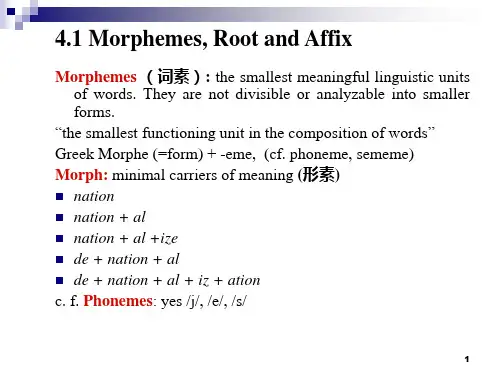
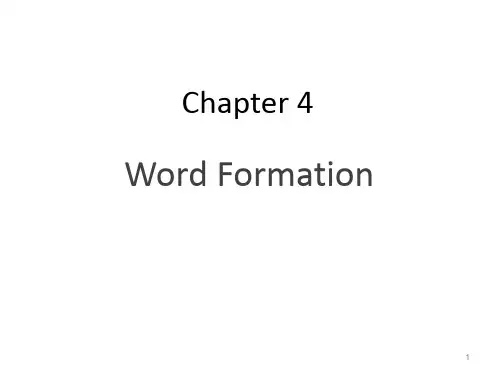
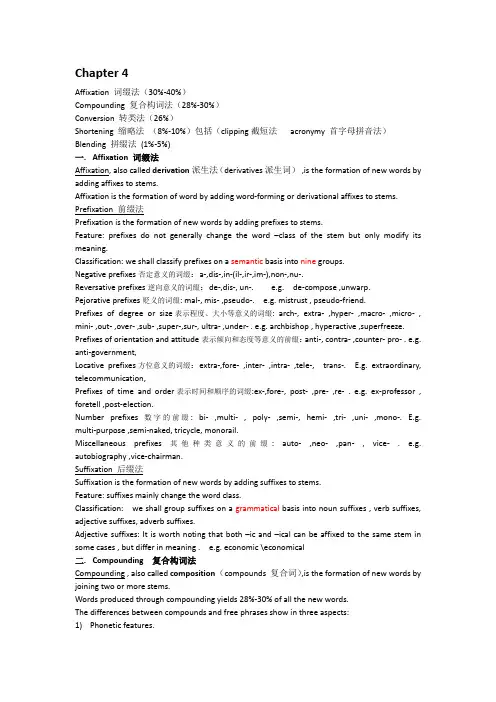
Chapter 4Affixation 词缀法(30%-40%)Compounding 复合构词法(28%-30%)Conversion 转类法(26%)Shortening 缩略法(8%-10%)包括(clipping截短法acronymy 首字母拼音法)Blending 拼缀法(1%-5%)一.Affixation 词缀法Affixation, also called derivation派生法(derivatives派生词),is the formation of new words by adding affixes to stems.Affixation is the formation of word by adding word-forming or derivational affixes to stems. Prefixation 前缀法Prefixation is the formation of new words by adding prefixes to stems.Feature: prefixes do not generally change the word –class of the stem but only modify its meaning.Classification: we shall classify prefixes on a semantic basis into nine groups.Negative prefixes否定意义的词缀:a-,dis-,in-(il-,ir-,im-),non-,nu-.Reversative prefixes逆向意义的词缀:de-,dis-, un-. e.g. de-compose ,unwarp.Pejorative prefixes贬义的词缀: mal-, mis- ,pseudo-. e.g. mistrust , pseudo-friend.Prefixes of degree or size表示程度、大小等意义的词缀: arch-, extra- ,hyper- ,macro- ,micro- , mini- ,out- ,over- ,sub- ,super-,sur-, ultra- ,under- . e.g. archbishop , hyperactive ,superfreeze. Prefixes of orientation and attitude表示倾向和态度等意义的前缀:anti-, contra- ,counter- pro- . e.g. anti-government,Locative prefixes方位意义的词缀:extra-,fore- ,inter- ,intra- ,tele-, trans-. E.g. extraordinary, telecommunication,Prefixes of time and order表示时间和顺序的词缀:ex-,fore-, post- ,pre- ,re- . e.g. ex-professor , foretell ,post-election.Number prefixes数字的前缀: bi- ,multi- , poly- ,semi-, hemi- ,tri- ,uni- ,mono-. E.g. multi-purpose ,semi-naked, tricycle, monorail.Miscellaneous prefixes其他种类意义的前缀: auto- ,neo- ,pan- , vice- . e.g. autobiography ,vice-chairman.Suffixation 后缀法Suffixation is the formation of new words by adding suffixes to stems.Feature: suffixes mainly change the word class.Classification: we shall group suffixes on a grammatical basis into noun suffixes , verb suffixes, adjective suffixes, adverb suffixes.Adjective suffixes: It is worth noting that both –ic and –ical can be affixed to the same stem in some cases , but differ in meaning . e.g. economic \economical二.Compounding 复合构词法Compounding , also called composition(compounds 复合词),is the formation of new words by joining two or more stems.Words produced through compounding yields 28%-30% of all the new words.The differences between compounds and free phrases show in three aspects:1)Phonetic features.2)Semantic features.3)Grammatical features.Formation of compounds1)Noun compoundse.g. Sit-in ,stockholder , up-bringing2)Adjective compoundse.g. law-abiding , record-breaking ,town-bred , four-leg.3)Verb compoundsThe limited number of verb compounds are created either through conversion or backformation. Verb compounds in the way of back-formation are formed mainly by dropping the suffixes:-er, -ing, -ion , etc.三.Conversion 转类法Conversion is the formation of new words by converting words of one class to another class. Conversion is a method of turning words of one part of speech to those of a different part of speech.1.An alternative for conversion is functional shift.2.The derivational process , in which an item is converted to a new word class without theaddition of an affix , is called zero-derivation .3.Words produced by conversion are primarily nouns , adjectives ,and verbs.The most productive conversion is the conversion that takes place between nouns and verbs.4.Full conversion and partial conversion are concerned with adjectives when converted tonouns.1)Full conversion: A noun fully converted from an adjective has all the characteristics ofnouns . It can take an indefinite article or –(e)s to indicate singular or plural number.2)partial conversion: nouns partially converted from adjectives do not possess all thequalities a noun does. They must be used together with definite articles.3)Such words as “the poor ”,”the richer ”,”the most corrupt” are all examples of partial. 5.The conversion of two syllable nouns into verbs involves a change of stress.双音节的名词转化成动词会有重音的变化。
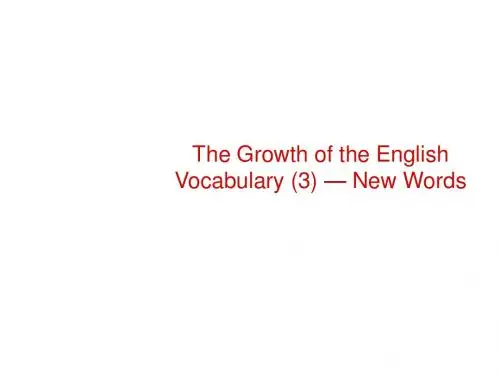
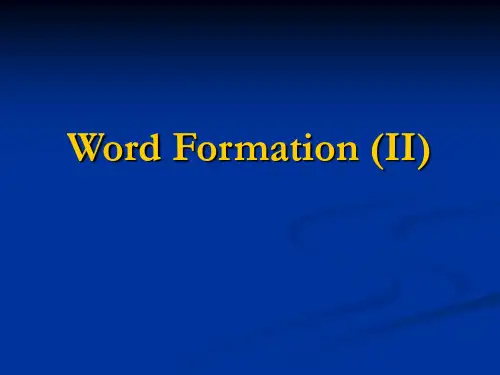
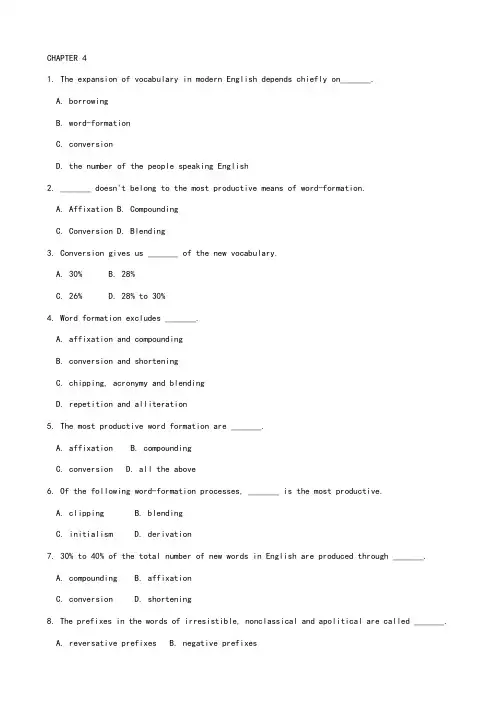
CHAPTER 41. The expansion of vocabulary in modern English depends chiefly on_______.A. borrowingB. word-formationC. conversionD. the number of the people speaking English2. _______ doesn't belong to the most productive means of word-formation.A. AffixationB. CompoundingC. ConversionD. Blending3. Conversion gives us _______ of the new vocabulary.A. 30%B. 28%C. 26%D. 28% to 30%4. Word formation excludes _______.A. affixation and compoundingB. conversion and shorteningC. chipping, acronymy and blendingD. repetition and alliteration5. The most productive word formation are _______.A. affixationB. compoundingC. conversionD. all the above6. Of the following word-formation processes, _______ is the most productive.A. clippingB. blendingC. initialismD. derivation7. 30% to 40% of the total number of new words in English are produced through _______.A. compoundingB. affixationC. conversionD. shortening8. The prefixes in the words of irresistible, nonclassical and apolitical are called _______.A. reversative prefixesB. negative prefixesC. pejorative prefixesD. locative prefixes9. Affixation is generally defined as the formation of words by adding word-forming or _______ to stems.A. affixesB. suffixes and prefixesC. inflectional affixesD. derivational affixes10. The words formed by affixation are called _______.A. affixesB. derivationsC. derivativesD. derivationals11. According to the _______ which affixes occupy in words, affixation falls into two subclasses: prefixation and suffixation.A. functionsB. positionsC. waysD. none of the above12. Prefixes do not generally change the _______ of the stem but only modify its meaning.A. word-classB. meaningC. formD. structure13. Accordingly, prefixes are classified on a semantic basis into _______ groups.B. 8D. 1014. These are negative prefixes except _______.A. dis-B. in-C. non-D. under-15. "Ex-" in the word "ex-prisoner" is _______.A. free rootB. bound rootC. inflectional affixD. derivational affix16. All of the following are pejorative prefixes except _______.A. mal-B. arch¬C. pseudo-D. mis-17. The "de -" in "decompose" is _______.A. a negative prefixB. a pejorative prefixC. a reversative prefixD. an orientation prefix18. The prefixes contained in the following words are called _______:pseudo, friend, malpractice, mistrust.A. reversative prefixedB. negative prefixesC. pejorative prefixesD. locative prefixes19. The prefixes in words anti-government, pro-student and contraflow are _______.A. prefixes of degree or sizeB. prefixes of orientation and attitudeC. prefixes of time and orderD. miscellaneous prefixes20. The prefixed contained in unwrap, de-compose and disallow are _______.A. reversative prefixedB. negative prefixesC. pejorative prefixesD. locative prefixes21. The prefixes in words extra-strong, overweight and archbishop are _______.A. negative prefixesB. prefixes of degree or sizeC. pejorative prefixesD. locative prefixes22. A subcutaneous infection is _______ the skin.A. on the surface ofB. aboveC. underD. below23. Some doctors prescribe medication to treat hyperactive children, because the children are extremely _______.A. activeB. passiveC. lazyD. diligent24. _______ of the given prefixes indicates number.A. fore-B. anti-C. semi-D. pan-25. The primary function of suffixes is to _______.A. change the word-class of rootsB. change the meaning of stemsC. change the grammatical function of stemsD. change the structure of roots26. The "auto" in "autobiography" is _______.A. a negative prefixB. a pejorative prefixC. a reversative prefixD. a miscellaneous prefix27. The prefixes in words bilingual, uniform and hemisphere are _______.A. number prefixesB. prefixes of degree or sizeC. pejorative prefixesD. locative prefixes28. _______ are contained in words trans-world, intra-party and forehead.A. Prefixes of orientation and attitudeB. Prefixes of time and orderC. Locative prefixesD. Prefixes of degree or size29. The prefixes in words new-Nazi, autobiography and pan-European are _______.A. negative prefixesB. prefixes of degree or sizeC. prefixes of time and orderD. miscellaneous prefixes30. Ex-student, foretell and post-election contain _______.A. negative prefixesB. prefixes of degree or sizeC. prefixes of time and orderD. locative prefixes31. Which of the following prefixes can not be used to indicate time and orderA. Ex-.B. Fore-.C. Post-.D. Para-.32. Which of the following is a case of suffixationA. HemisphereB. AttemptC. NATOD. Respondent33. A multiplied insect has _______ feet.A. twoB. fourC. sixD. many34. A tricycle has _______ wheels.A. oneB. twoC. threeD. Four35. Which of the following belongs to number prefixesA. Auto-.B. Mis-.C. Hemi-.D. Pre-.36. We usually group suffixes on a _______ basis into noun suffixes, verb suffixes, adjective suffixes, etc.A. grammatical C. meaningfulB. structural D. practical37. -eer, -er, -ess, -ette, -let are all suffixes added to noun bases to produce _______ nouns.A. abstract C. concreteB. de-verbal D. de-adjective38. These are adjective suffixes except _______.A. -ishB. -iveC. -aiD. -ance39. The word "courageous" is created by _______.A. noun suffixesB. adverb suffixesC. adjective suffixesD. verb suffixes40. The meanings of "comic" and "comical" are _______.A. sameB. identicalC. similarD. different41. Which of the following suffixes can be used to form both nouns and adjectivesA. -ion.B. -ism.C. -ity.D. -ist.42. The following are all denominal suffixes EXCEPT _______.A. -fulB. -wiseC. -lessD. -like43. _______ of the following is not a verb suffix.A. -ateB. -enC. -ed44. The suffixes in words heighten, symbolize are _______.A. noun suffixesB. verb suffixesC. adverb suffixesD. adjective suffixes45. The suffixes in words clockwise, homewards are _______.A. noun suffixesB. verb suffixesC. adverb suffixesD. adjective suffixes46. The differences between compounds and free phrases show in _______ aspects.A. phonetic featuresB. semantic featuresC. grammatical featuresD. all the above47. There are _______ major classes of compounds.A. twoB. fourC. threeD. five48. " Washing machine" is a word formed by _______.A. prefixationB. compoundingC. conversionD. blending49. "Law-abiding" belongs to _______.A. adjective compoundB. noun compoundC. verb compoundD. none of the above50. "up-bringing" belongs to _______.A. adjective compoundB. noun compoundB. verb compound D. none of the above51. Verb compounds are created either through _______ or _______.A. affixation; conversionB. clipping; affixationC. conversion; backformationD. backformation; borrowing52. Which of the following is not through backformationA. To mass-produce.B. To lip-read.C. To nickname.D. To chain-smoke.53. Conversion is a method _______.A. of turning words of one part of speech to those of a different part of speechB. of converting words of one meaning into different meaningC. of deriving words through grammatical meansD. of changing words in morphological structure54. In a derivational process, an item is converted to a new word class without the addition of an affix. The name is _______.A. full conversionB. partial conversionC. functional shiftD. zero-derivation55. Words involved in conversion are primarily _______.A. nouns, verbs and adverbsB. nouns, adjectives and verbsC. nouns, prepositions and verbsD. adjectives, adverbs and verbs56. Almost all monomorphemic _______ can be conversed into nouns, which are semantically related to the original verbs in various ways.A. verbsB. adjectivesC. adverbsD. prepositions57. Nouns converted from adjectives have all the characteristics of nouns and achieve a full noun status, thus known as _______.A. partial conversionB. full conversionC. speech shiftD. grammatical shift58. Nouns partially converted from adjectives do not possess all the qualities a noun does. Theymust be used together with _______.A. plural formsB. single formsC. adjectivesD. definite articles59. In most cases a noun can be converted to a verb _______.A. with some changesB. without any changeC. with some changes in spellingD. without any change in pronunciation60. The "house" in "the peasant housed him" belongs to the conversion _______.A. between noun and adjectiveB. between noun and verbC. between verb and adjectiveD. none of the above61. The conversion of two-syllable nouns into verbs involves a change of _______.A. spellingB. pronunciationC. stressD. function62. "Empty" in the sentence "The meeting was over and the meeting-room began to empty" is _______.A. adjectiveB. verbC. nounD. four63. Which of the following words is NOT formed through clippingA. Dorm.B. Motel.C. Gent.D. Zoo.64. _______ are words pronounced letter by letter.A. InitialismsB. AcronymsC. BlendsD. Clips65. Of the following words, _______ is an initialism.A. UNB. NATOC. BASICD. UNESCO66. "BBC" is formed in the way of _______.A. acronymyB. clippingC. back-formationD. prefixation67. "TV" is a (n) _______.A. initialismB. acronymC. derivativeD. compound68. Back-formation is considered to be the opposite process of _______.A. prefixationB. suffixationC. acronymy D- conversion69. Back-formation is the method of creating new words by _______ the supposed suffixes.( )A. removingB. combiningC. shorteningD. considering70. Back-formation usually involves _______ types of words.A. threeB. fourC. fiveD. two71. Stylistically, back-formed words are largely some of them have not gained public acceptance.A. formalB. adjectivesC. human nounsD. informal72. The word "sandwich" which now denotes a popular fast food originates from _______.A. FaradayB. John MontagueC. BloomersD. Thomas More73. Mackintosh, bloomers and cherub are from _______.A. names of booksB. names of placesC. names of peopleD. trade-names74. Rugby, afghan and champagne are words coming from _______.A. names of booksB. names of placesC. names of peopleD. tradenames75. Utopia, odyssey and Babbit are words from _______.A. names of booksB. names of placesC. names of peopleD. tradenames76. Which of the following words is NOT from ChineseA. Tea.B. Ketchup.C. Kungfu.D. Czar.77. Omega, Xerox and orlon are words from _______.A. names of booksB. names of placesC. names of peopleD. tradenames78. _______ are affective words as they are expressions of emotions such as oh, dear, me, alas.A. PrepositionsB. InterjectionsC. ExclamationsD. Explanations79. 30% to 40% of the total number of new words in English are produced through _______A. compoundingB. affixationC. conversionD. shortening80. The prefixes mal- in maltreat, mis- in misleading and pseudo- in pseudo- scientific are ______ prefixes.A. negativeB. reversativeC. pejorativeD. locative81. The prefixes like un- and dis- can be regarded both as negative prefixes and as privative prefixes. The justification of their category lies in _______.A. meaningB. functionC. collocationD. word-class82. Some prefixes are categorized as _______ since their chief function is to change the base from one word class to another.A. conversion prefixesB. prefixes of orientation and attitudeC. inflectional prefixesD. prefixes of time and order83. The word employer is composed of " employ+er", of which -er is the so-called _______ suffix.A. verbB. deverbal nounC. denominalD. denominal noun84. As a suffix, _______ means "receiver of the action".A. -eerB. -essC. -erD. -ee85. The suffix -or in actor is a(n) _______ suffix and -ance in performance is a(n) _______noun suffix.A. concrete; concreteB. abstract; concreteC. abstract; abstractD. concrete; abstract86. The suffix -ful in mouthful is a suffix and in graceful is a _______ suffix.A. denominal adjective; denominal adjectiveB. denominal noun; denominal adjectiveC. denominal noun; denominal nounD. denominal adjective; denominal noun87. Of the three words, _______ refers to the physical or heroic qualities of a man, _______ is applied to nonhumans and _______ implies unwelcome masculine attributes usually in a woman.A. manly; manlike; mannishB. manly; mannish; manlikeC. mannish; manlike; manlyD. mannish; manly; manlike88. The pattern of deadline and blueprint is _______ in formation.A. n. + n.B. n. + v.C. adj. + n.D. adj. + v.89. The grammatical relationship between the elements in fist-fighting is _______.A. subject-}-verbB. verb+objectC. verb ~h adverbialD. subject+adverbial90. The conversion of two syllable nouns into verbs usually involves a change of _______.A. spellingB. pronunciationC. stressD. function91. Through _______, we get lip-read out of lip-reading.A. lexicalizatjonB. conversionC. rearrangementD. backformation92. The process in which nouns converted from adjectives do not possess all the qualities a noun does is called a _______ conversion.A. functionalB. fullC. partialD. miscellaneous93. The word motel comes from "motor-f-hotel". This is an example of _______ in terms of word formation.A. backformationB. conversionC. blendingD. acronym94. The words socio-linguistic and psycho-analysis are _______ according to the bases with which they are coined.A. compoundsB. blendsC. derivativesD. acronyms96. The case of exec derived from executive is an instance of _______ clipping.A. frontB. backC. front and backD. phrase97. AIDS, which is an instance of _______, is short for "acquired immune deficiency syndrome".A. pure acronymsB. hybrid acronymsC. syllabic acronymsD. initialisms98. The word medicare comes from "medical+care", so its structure is _______.A. head+wordB. word+tailC. head+headD. head+tail99. Almost all the back-formed words are _______.A. nounsB. verbsC. adjectivesD. adverbs100. Words produced through affixation constitute _______ of all the new words.A. 20% to 30%B. 30% to 40%C. 40% to 50%D. 10% to 20%101. The most productive word formation is _______.A. affixationB. compoundingC. conversionD. acronymy102. The expansion of vocabulary in modern English depends chiefly on . [ ]A. word-formationB. prefixationC. suffixationD. compounding103. _______ is the formation of words by adding word-forming or derivational affixes to stems.A. PrefixationB. DerivationC. SuffixationD. Compounding104. According to the positions which affixes occupy in words, affixation falls into two subclasses: _______ and _______.A. clipping, blendingB. compounding, conversionC. conversion, derivationD. prefixation, suffixation105. We shall classify prefixes on semantic basis intoA. sevenB. eightC. nineD. eleven106. The prefix "pseudo" is _______.A. a negative prefixB. a reversative prefixC. a locative prefixD. a pejorative prefix107. The "de-" in "decompose" is _______.A. a negative prefixB. a pejorative prefixC. a reversative prefixD. an orientation prefix108. The chief function of prefixation is to _______.A. change meanings of the stemB. change the word-class of the stemC. change grammatical functionD. all the above109. The "auto" in "autobiography" is _______.A. a negative prefixB. a locative prefixC. a reversative prefixD. a miscellaneous prefix110. The chief function of suffixation is to _______.A. change meanings of the stemB. change the word class of the stemC. change the lexical meaningD. all the above111. The word "courageous" is created by _______.A. noun suffixesB. adverb suffixesC. adjective suffixesD. verb suffixes112. The meanings of "comic" and "comical" are _______.A. sameB. identicalC. similarD. different113. For the word "political”, its negative form is " _______.A. apoliticalB. ilpoliticalC. inpoliticalD. impolitical114. The differences between compounds and free phrases show in _______.A. phonetic featuresB. semantic featuresC. grammatical featuresD. all the above115. _______ is the formation of new words by joining two or more stems.A. SuffixationB. CompositionC. ConversionD. Clipping116. " Law-abiding" belongs to _______.A. adjective compoundB. noun compoundC. verb compoundD. none of the above117. "Sit-in" belongs to _______.A. adjective compoundB. noun compoundC. verb compoundD. none of the above118. "up-bringing" belongs to _______.A. adjective compoundB. noun compoundC. verb compoundD. none of the above119. Verb compounds are created either through _______ or _______.A. affixation/conversionB. clipping/affixationC. conversion/backformationD. back-formation/borrowing120. In compounds, the word stress usually occurs on _______ whereas in noun phrase _______ is generally stressed if there is only one stress.A. the first element/the second elementB. the second element/the first elementC. the first element/the first elementD. the second element/the second element121. Most compounds consist of only _______ stems.A. threeB. twoC. fourD. five122. Words mainly involved in conversion are _______.A. nouns, verbs and adverbsB. nouns, adjectives and verbsC. nouns, prepositions and verbsD. adjectives, adverbs and verbs123. The derivational process, in which an item is converted to a new word class without the addition of an affix, is called _______.A. full conversionB. partial-conversionC. semantic shiftD. zero-derivation124. The "house" in "the peasant housed him" belongs to the conversion _______.A. between noun and adjectiveB. between noun and verbC. between verb and adjectiveD. none of the above125. Nouns converted from adjectives have all the characteristics of nouns and achieve a full noun status, thus known as _______.A. partial conversionB. full conversionC. functional shiftD. grammatical shift126. Nouns partially converted from adjectives do not possess all the qualities a noun does. They must be used together with _______.A. plural formsB. single formsC. adjectivesD. definite articles127. The conversion of two syllable nouns into verbs involves a change of _______.A. spellingB. pronunciationC. stressD. function128. Words produced by conversion are primarily _______.A. nounsB. adjectivesC. verbsD. all the above129. The most productive conversion is the conversion that takes place _______.A. between nouns and verbsB. between nouns and adjectivesC. between verbs and adjectivesD. none of the above130. The overwhelming majority of blends are _______.A. verbsB. nounsC. adjectivesD. adverbs131. Back-formation is therefore the method of creating words by _______ the supposed suffixes.A. removingB. shorteningC. addingD. writing132. Back-formation is considered to be the opposite process of _______.A. prefixationB. suffixationC. acronymyD. conversion133. Words formed by acronymy can be divided into initialisms and acronyms depending on _______.A. the grammatical functionB. the pronunciation of the wordsC. the spelling wayD. none of the above134. Word formation excludes _______.A. affixation and compoundingB. conversion and shorteningC. chipping, acronymy and blendingD. repetition and alliteration135. Which of the following is a case of suffixationA. Hemisphere.B. Disunite.C. NATO.D. Respondent.136. A tricycle has _______ wheels.A. twoB. fourC. sixD. three137. The prefixes in the words*, irresistible, non-classical and apolitical are called _______.A. reversative prefixesB. negative prefixesC. pejorative prefixesD. locative prefixes138. Rugby, afghan and champagne are words coming from _______.A. names of booksB. names of placesC. names of peopleD. tradenames139. Some doctors prescribe medication to treat hyperactive children, because the children are extremely _______ .A. activeB. passiveC. lazyD. diligent140. Ex-student, foretell and post-election contain _______.A. negative prefixesB. prefixes of degree or sizeC, prefixes of time and order D. locative prefixes141. _______are words pronounced letter by letterA. InitialismsB. AcronymsC. BlendsD. Compounds142. What does the neo-mean in neo-NaziA. Old.B. Poor.C. New.D. Rich.143. Which of the following words is NOT formed through clippingA. Dorm.B. Slurb.C. Gent.D. Zoo.144. Which of the following belongs to number prefixesA. Fore-.B. Pro-.C. Hemi-.D. Pre-.145. There are _______ major classes of compounds.A. twoB. fourC. threeD. five146. Mackintosh, bloomers and cherub are from _______.A. names of booksB. names of placesC. names of peopleD. tradenames147. The suffixes in words clockwise, homewards are _______.A. noun suffixesB. verb suffixesC. adverb suffixesD. adjective suffixes148. The suffixes in words heighten, symbolize are _______.A. noun suffixesB. verb suffixesC. adverb suffixesD. adjective suffixes149. Of the following words, _______ is an initialism.A. UNB. NATOC. BASICD. UNESCO150. Of the following word-formation processes, is the _______ most productive.A. clippingB. blendingC. initialismD. affixation151. The prefixes in words neo-Nazi, autobiography and pan-European are _______.A. negative prefixesB. prefixes of degree or sizeC. prefixes of time and orderD. miscellaneous prefixes152. Which of the following words is NOT from ChineseA. Tea.B. Ketchup.C. Kungfu.D. Czar.153. Which of the following suffixes can be used to form both nouns and adjectivesA. -ion.B. -ism.C. -ity.D. -ist.154. Utopia, odyssey and Babbit are words from _______.A. names of booksB. names of placesC. names of peopleD. tradenames1. Affixes and compounding processes may become _______ on one time.2. Not all the words that are produced by applying the word-forming rule are _______ .3. Words produced through compounding yields _______ of all the new word.4. New words which are created by adding affixes to stems are called _______.5. _______ is the formation of new words by adding prefixes to stems.6. The majority of prefixes are _______ by their non-class-changing nature.7. Affixation, also called _______, is one of the word formations.8. Derivational affixes can be further divided into _______ and suffixes.9. Prefixes are those affixes that added to the head of words, which primarily change the _______ of the stem.10. The formation of words by adding word-forming affixes to stems is called _______.11. The chief function of _______ is not to change the word class of the stem, but to change its meaning.12. Suffixation is the formation of new word by adding _______ to stems.13. In the word "post-war" , "post-" is a prefix of _______.14. Compounding is the formation of new words by joining _______.15. Compounds and derived words are _______ words and the meanings of many are the sum total of the morphemes combined.16. The open _______ are the same in form as free phrases.17. The stress patterns of compounds are not _______.18. Compounds are different from free phrases in _______ unit.19. A compound tends to play a single _______ role in a sentence.20. An alternative for conversion is _______.21. _______ is the formation of new words by converting words of one class to another class.22. Almost all monomorphemic verbs can be used as nouns, which are _______ related to the original verbs in various ways according to Quirk et al.23. Such words as "the richer”, "the poor”, "the most corrupt" are all examples of _______.24. The words "autocide" and "telex" are formed by _______.25. With the development of market economy psywar becomes more and more popular. "Psywar" means _______.26. _______ is the formation of new words by combining parts of two words or a word plus a part of another word.27. A common way of making a word is to shorten a longer word by cutting a part off the original and using what remains instead. This is called _______.28. _______ is the process of forcing new words by joining the initial letters of names of social and political organizations or special phrases and technical terms.29. _______ is considered to be the opposite process of suffixation.30. A word is the _______ of form and meaning.31. Modern English expands its vocabulary chiefly through _______.32. The three main means of creating new words in modern English are _______, compounding and conversion.33. Shortening including clipping and _______ is also a way of forming new words in modern English.34. Affixation falls into two subcategories prefixation and _______.35. Affixation is also known as _______.36. The prefixes bi-, multi- and tri- are all _______ prefixes.37. Compounds can be written solid, _______ and open.38. A compound is a unit consisting of more than one base and functioning both grammatically and _______ as a single word.39. The words sit-in and handshake are both _______ compounds.40. Verb compounds are generally created either through _______or back-formation.41. Compounds are largely the results of _______ of phrases.42. If we need a word which is not found, we can easily make one through _______ or rearrangement of word-forming elements.43. Conversion is also known as _______ since it does not change the morphological structure of words but their function.44. Regarded as a derivational process without the addition of an affix, conversion can be called as _______.45. Words formed through acronymy can be divided into _______ and acronyms depending on the pronunciation of the words.46. Such words as goody-goody, willy-nilly and fiddle-faddle are known as _______ in terms of word formation.47. The process is called _______ when proper names are changed into common words in use.48. Words like nylon, orlon and rayon come from _______, a type of proper names.49. The overwhelming majority of blends are _______.50. Words imitating natural sounds are _______words.51. Affixation, also called _______, is one of the word formations.52. In modem times, the expansion of _______ is mainly through word-formation.53. The number of inflectional affixes is _______and stable, which makes English one of the easiest language to learn.54. According to suffixation theory, “villager" is called denominal noun and “employer" is called _______noun.55. Derivational affixes can be further divided into _______and suffixes.56. Prefixes do not generally change the _______of the stem but only modify its meaning.57. Not all the words that are produced by applying the word-forming rule are _______.58. Compounding is the formation of _______ by joining two or more stems.59. Words produced through compounding yields _______ of all the new words.60. _______ conversion and _______ conversion are concerned with adjectives when converted to nouns.61. An alternative for conversion is _______.。
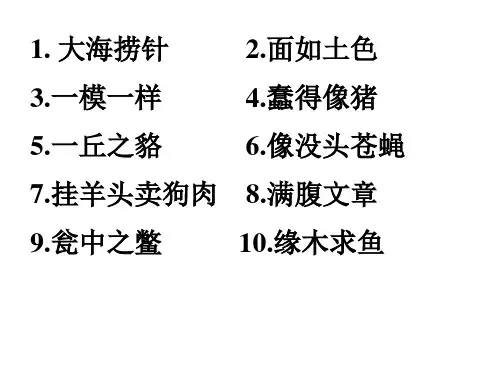
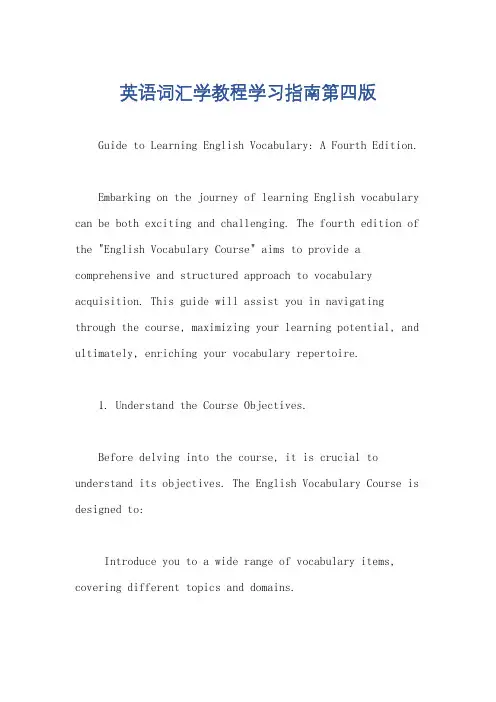
英语词汇学教程学习指南第四版Guide to Learning English Vocabulary: A Fourth Edition.Embarking on the journey of learning English vocabulary can be both exciting and challenging. The fourth edition of the "English Vocabulary Course" aims to provide a comprehensive and structured approach to vocabulary acquisition. This guide will assist you in navigating through the course, maximizing your learning potential, and ultimately, enriching your vocabulary repertoire.1. Understand the Course Objectives.Before delving into the course, it is crucial to understand its objectives. The English Vocabulary Course is designed to:Introduce you to a wide range of vocabulary items, covering different topics and domains.Enhance your ability to use vocabulary effectively in different contexts.Foster your understanding of word origins, meanings, and relationships.Cultivate your interest in language and vocabulary learning.By keeping these objectives in mind, you can stay focused on the end goal of the course and measure your progress accordingly.2. Embrace a Regular Learning Routine.Consistency is key in vocabulary learning. Commit to a regular learning routine, whether it's daily, weekly, orbi-weekly. Set aside a dedicated time for vocabulary practice and stick to it. This regularity will help you retain new words better and gradually expand your vocabulary.3. Utilize Multiple Learning Strategies.Vocabulary learning is not one-size-fits-all. Experiment with different learning strategies to find what works best for you. Some effective strategies include:Contextual Learning: Place new words in sentences or short paragraphs to understand their meaning and usage better.Mnemonic Devices: Use memory techniques like acronyms, rhymes, or stories to help you remember new vocabulary.Visual aids: Leverage visual aids like flashcards, charts, or infographics to enhance your understanding.Interactive Learning: Engage in discussions, debates, or writing exercises to practice using new vocabulary in real-life scenarios.4. Make Use of Supplementary Resources.The course textbook is a great starting point, butdon't limit yourself to it. Explore supplementary resources like dictionaries, online vocabulary games, or language exchange platforms to further enhance your vocabulary learning experience. These resources can provide additional context, examples, and practice opportunities.5. Reflect and Revise.Regularly reflecting on your learning progress and revising what you've learned is crucial for long-term retention. Take time to review the vocabulary you've covered, assess your understanding, and identify areas where you need to improve. Revisiting previously learned words periodically will help巩固 your knowledge and prevent forgetting.6. Practice in Real-Life Contexts.The ultimate goal of vocabulary learning is to use the words effectively in real-life contexts. Therefore, make it a point to practice using the new vocabulary in your dailylife. Whether it's through speaking, writing, or reading, actively using the words will help you internalize them and increase your confidence in their use.7. Embrace Challenges and Celebrate Successes.Vocabulary learning can come with its challenges, especially when dealing with complex words or concepts. Don't be afraid to embrace these challenges and view them as opportunities for growth. Celebrate your successes, whether it's mastering a new word or improving your vocabulary usage in a conversation. This positive reinforcement will keep you motivated and excited about continuing your vocabulary learning journey.In conclusion, the fourth edition of the English Vocabulary Course is a comprehensive resource for enhancing your vocabulary skills. By understanding the course objectives, embracing a regular learning routine, utilizing multiple learning strategies, making use of supplementary resources, reflecting and revising, practicing in real-life contexts, and embracing challenges and celebratingsuccesses, you can maximize your learning potential and enjoy the rich rewards of vocabulary mastery.。

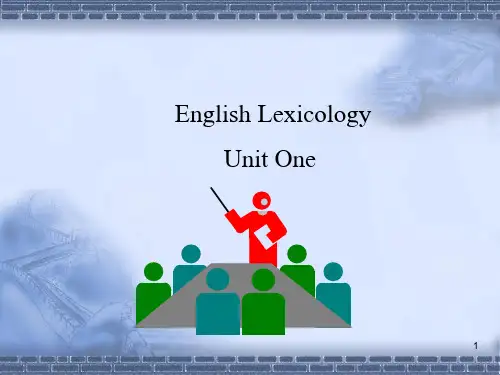
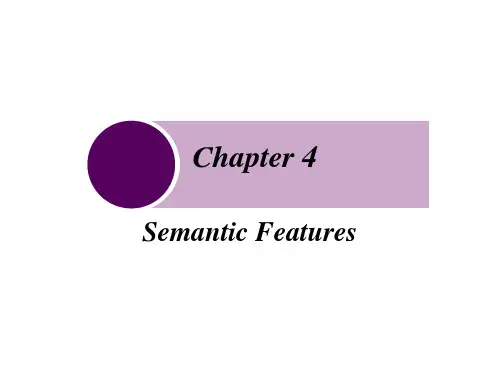
Unit 4 Significance of Words一、Significance of wordsI. Definition of SignificanceSignificance of words is the nominating things, behaviors and qualities. ——PlatoA Word is the symbol of a singular definition, always pointing to its definition. ——Wilhelm von HumoldtII. What is Semantic meaning?In a broad sense, semantic meaning represents human’s thinking and thoughts. Without semantic meaning, people couldn’t achieve the mutual communication and understanding.In a narrow sense, semantic meaning refers to the language meaning of the words and sentences, also called the word’s meaning and the sentence’s meaning.一般来说,研究意义特别是研究语言意义的学科被称为语义学(semantics or semasiology)。
I. 以下各句中country表示不同的意思,从B栏中选出country在A栏各句中的准确意义:A1. What do you mean by a farming country?2. The candidate has won the sixty percent of the country.3. There is a great gap between rich and poor countries.4. The children are looking forward to havinga picnic in the country next week.5. The young scientist left his country and went on with his medical research abroad.Ba.a nation or a state with its land or population.b.T he nation or state of one’s birth or citizenshipc.The people of a nation or stated.L and with a social nature or charactere.The countrysideII. 根据词义的拟声理据,将下列B栏中模拟动物叫声的词语与A栏中对应的动物名称词相配:AApes-, bears-, beetles-, birds-, bulls-, cats-, cattle-, crickets-, doves-, donkeys -, ducks-, flies-, foxes-, geese-, hens-, larks-, mice-, monkeys-, owls-, pigs-, , ravens-, sheep-, snakes-, swans-, turkeys-, wolves-.BSing, buzz, bray, gibber, neigh, quack, coo, cry, chatter, bellow, growl, hoot, bleat, low, hiss, grunt, drone, purr, yelp, squeak, gabble, howl, gobble, cluck, chirp, warble, croak ChauvinismApes-gibber, bears-growl, beetles-drone, birds-Sing, bulls-bellow, cats-purr, cattle -low, crickets-chirp, doves-coo, donkeys -bray, ducks-quack, flies-buzz, foxes-yelp, geese-gabble, hens-cluck, larks-warble, mice-squeak, monkeys-chatter, owls-hoot, pigs-grunt, oink, ravens-croak,sheep-bleat, snakes-hiss, swans-cry, turkeys-gobble, wolves-howl.三、词义的分类I.conceptual meaning概念意义可分解成若干个最小的意义单位II.connotative meaning词的内涵意义因人而异、因不同年龄而异某些词语的内涵意义带有民族性特征III.social meaning如: daddy, male parent, fatherdomicile, residence, abode, homeIV.affective meaningappreciative and pejorative (褒义和贬义)V.reflective meaning禁忌词taboo words “委婉词语”euphemistic expressionsVI.collocative meaningpretty: girl, lady, woman, flower, garden, color,villagehandsome: boy, man, car, vessel, overcoat, palace, airlinerVII.thematic meaninga.Mrs. Smith donated the first prize.b.The first prize was donated by Mrs. Smith.四、词义分析Semantic Analysis Componential Analysis and Semantic Field Theory语义成份分析法和语义场理论ponential AnalysisII.Semantic Field Theory1.a nimal2.1. domestic animal 2.2.wild animal2.1: chicken, cat, dog, pig, sheep, cow, horse, 2.2: panda, monkey, wolf, tiger, lion, elephant, 1. 语义场的三层次性质1)层次性2)系统性3)相对性2. 语义场的类型1)分类义场2)顺序义场3)关系义场可分为同义义场(synoymy)和反义义场(antonymy)。
英语词汇学教程第四版课后答案1、John will go home as soon as he _______ his work. [单选题] *A. finishB. will finishC. finishedD. finishes(正确答案)2、47.Yao Ming is tall. That's one of his ________. [单选题] *A.advantageB.advantages(正确答案)C.disadvantageD.disadvantages3、It seems slow for children to become _____ ,while adults often feel time flies. [单选题] *A. growns-upsB. growns-upC. grown upsD. grown-ups(正确答案)4、The young man had decided to give up the chance of studying abroad, _____ surprised his parents a lot. [单选题] *A. whenB. whereC. which(正确答案)D. that5、He kept walking up and down, which was a sure()that he was very worried. [单选题] *A. sign(正确答案)B. characterC. natureD. end6、79.On a ________ day you can see the city from here. [单选题] *A.warmB.busyC.shortD.clear(正确答案)7、I’m so tired after _______ walk. [单选题] *A. three hour’sB. three hours’(正确答案)C. three hoursD. three hour8、93.Welcome ________ our school! [单选题] *A.to(正确答案)B.inC.atD./9、How beautiful the flowers are! Let’s take some _______. [单选题] *A. photos(正确答案)B. potatoesC. paintingsD. tomatoes10、I arrived _____ the city _____ 9:00 am _______ April [单选题] *A. at, in, atB. to, on, atC. in, or, atD. in, at, on(正确答案)11、Many volunteers _______ food and water to the local people in Japan after tsunami(海啸). [单选题] *A. gave out(正确答案)B. cut outC. put outD. found out12、Mr. Wang is coming to our school. I can’t wait to see _______. [单选题] *A. herB. him(正确答案)C. itD. them13、____ China is ____ old country with ____ long history. [单选题] *A. /, an, a(正确答案)B. The, an, aC. /, an, /D. /, the, a14、5 He wants to answer the ________ because it is an interesting one. [单选题] * A.problemB.question(正确答案)C.doorD.plan15、Before leaving the village, he visited the old house _____ he spent his childhood. [单选题] *A in which(正确答案)B. whichC. to whichD at which16、I hope to see you again _______. [单选题] *A. long long agoB. long beforeC. before long(正确答案)D. long17、--Jimmy, you are supposed to?_______ your toys now.--Yes, mom. [单选题] *A. put upB. put onC. put away(正确答案)D. put down18、I _______ play the game well. [单选题] *A. mustB. can(正确答案)C. wouldD. will19、______ the morning of September 8th, many visitors arrived at the train station for a tour.()[单选题] *A. FromB. ToC. InD. On(正确答案)20、Will you please say it again? I _______ you. [单选题] *A. didn’t hear(正确答案)B. don’t heardC. didn’t heardD. don’t hear21、At nine yesterday morning, I ______ an English class while they ______ a PE class.()[单选题] *A. was having; were having(正确答案)B. had; hadC. was having; hadD. had; were having22、There are many_____desks in the room. [单选题] *rge old brown(正确答案)B.old large brownrge brown oldD.brown old large23、In 2019 we moved to Boston,()my grandparents are living. [单选题] *A. whoB. whenC. where(正确答案)D. for which24、His father always _______ by subway. [单选题] *A. go to workB. go to schoolC. goes to bedD. goes to work(正确答案)25、—Who came to your office today, Ms. Brown?—Sally came in. She hurt ______ in P. E. class. ()[单选题] *A. sheB. herC. hersD. herself(正确答案)26、My sister _______ listen to music when she was doing her homework.[单选题] *A. used to(正确答案)B. use toC. is used toD. uses to27、( ). I’m _____ in that ______ film [单选题] *A. interesting interestedB. interested interesting(正确答案)C. interested interestedD. interesting interesting28、She found her wallet()she lost it. [单选题] *A. where(正确答案)B. whenC. in whichD.that29、—Look at those purple gloves! Are they ______, Mary?—No, they aren’t. ______ are pink. ()[单选题] *A. you; IB. your; MyC. yours; Mine(正确答案)D. you; Me30、This seat is vacant and you can take it. [单选题] *A. 干净的B. 没人的(正确答案)C. 舒适的D. 前排的。
英语词汇学第四版课后答案1、———Must I return the book you lent me to you now? ——No, you( ). You can keep it for another few days. [单选题] *A.can’tB. shouldn'tC. mustn'tD. don, t have to(正确答案)2、1——May I help you? You seem to be having some problems.——_______ , thanks. Ithink I can manage. [单选题] *A. All rightB. No problemC. It’s all right(正确答案)D. There’s no way3、She _______ so much _______ her mother. [单选题] *A. looks; like(正确答案)B. looks; forC. looks; afterD. looks forwards; to4、The hall in our school is _____ to hold 500 people. [单选题] *A. big enough(正确答案)B. enough bigC. very smallD. very big5、How lovely a day,()? [单选题] *A. doesn't itB. isn't it(正确答案)C.shouldn't itD.hasn't it6、—Tony, it’s cold outside. ______ wear a jacket?—OK, mom.()[单选题] *A. Why not(正确答案)B. Why don’tC. Why did youD. Why do you7、35.Everyone in China ______ Mid-Autumn Day. [单选题] *A.likes(正确答案)B.likeC.is likingD.are like8、The train is coming. Be ______! [单选题] *A. careful(正确答案)B. carefullyC. carelessD. care9、Study hard, ______ you won’t pass the exam. [单选题] *A. or(正确答案)B. andC. butD. if10、No writer will be considered()of the name until he writes a work. [单选题] *A. worthlessB. worthy(正确答案)C. worthwhileD. worth11、85.You’d better? ? ? ? ? a taxi, or you’ll be late. [单选题] *A.take(正确答案)B.takingC.tookD.to take12、Boys and girls, please _______ your favorite book here and show it to us next class. [单选题] *A. bring(正确答案)B. sellC. buyD. take13、When you’ve finished with that book, don’t forget to put it back one the shelf, ____? [单选题] *A. do youB. don’t youC. will you(正确答案)D. won’t you14、I’m sorry there are ______ apples in the fridge. You must go and buy some right now.()[单选题] *A. a littleB. littleC. a fewD. few(正确答案)15、Was()that I saw last night at the concert? [单选题] *A. it you(正确答案)B. not youC. youD. that yourself16、The()majority of the members were against the idea. [单选题] *A. substantialB. enormousC. considerable(正确答案)D. overwhelming17、Amy and her best friend often ______ books together.()[单选题] *A. read(正确答案)B. readsC. is readingD. to read18、一Mary wants to invite you to see the movie today. 一I would rather she(B)me tomorrow. [单选题] *A.tellsB. told (正确答案)C. would tellD. had told19、In winter, animals have a hard time_____anything to eat. [单选题] *A.to findB.finding(正确答案)C.foundD.to finding20、Before leaving the village, he visited the old house _____ he spent his childhood. [单选题] *A in which(正确答案)B. whichC. to whichD at which21、I think ______ time with my friends is fun for me.()[单选题] *A. spendB. spendC. spending(正确答案)D. spent22、During the Mid-Autumn Festival, family members often gather together _________ ameal, admire the moon and enjoy moon cakes. [单选题] *A. shareB. to share(正确答案)C. having sharedD. shared23、He _______ getting up early. [单选题] *A. used toB. is used to(正确答案)C. is usedD. is used for24、Though the _____ drama is wonderful, I guess most audiences will be tired as it is too long. [单选题] *A. four-hour(正确答案)B. four hoursC. four-hoursD. four-hour's25、Although the story is written for children, it can be read by adult, _____. [单选题] *A. alsoB. eitherC. as wellD. too(正确答案)26、67.—What can I do for you?—I'm looking at that dress.It looks nice.May I ________?[单选题] *A.hold it onB.try it on(正确答案)C.take it offD.get it off27、You should take the medicine after you read the _______. [单选题] *A. linesB. wordsC. instructions(正确答案)D. suggestions28、--Jimmy, you are supposed to?_______ your toys now.--Yes, mom. [单选题] *A. put upB. put onC. put away(正确答案)D. put down29、This message is _______. We are all _______ at it. [单选题] *A. surprising; surprisingB. surprised; surprisedC. surprising; surprised(正确答案)D. surprised; surprising30、The Spring Festival is on the way.Many shops have _______ huge posters with the word sales. [单选题] *A. put up(正确答案)B. put onC. put outD. put off。
1011词汇学4Lexicology Lecture 4I Test1________ Henry felt a great weight taken off his mind.A. His duty was fulfilledB. His duty fulfilledC. His duty fulfillingD. His duty had been fulfilled2.Air is to us _______ water is to fish. We should take measures to keep air and water clean.A. thatB. whatC. itD. which3. Listening to lecture given by Professor Stephen Hawking is an exiting moment, _______ I am looking forward to.A. whatB. thatC. itD. one4. Once ___, this power station will supply all the neighboring towns and villages with electricity.A. it being completedB. it completedC. completedD. it completes5. I would have gone to visit him in the hospital had it been at all possible, but I ___ fully occupied the whole of last week.A. wereB. had beenC. have beenD. was6. But that he ___ short of money at the time, he would have come to help us.A. had beenB. wasC. has beenD. would be7. In her time, Mrs. Duncan was _______ today a liberated womanA. calling what we wouldB. who would be callingC. what we would callD. she would call it8.At each end of the tube_______, one which gathers light and one which magnifies the imageA. are two lenses thereB. two lenses areC. are two lenses D . two lenses are there9、You see the lightning ____________ it happens ,but you hear the thunder later.A.the instantB. for an instantC. on the instantD. this instant10. The joys of travel, having long ______the disabled, are opening up to virtually anyone who has the means.A. omittedB. missedC. neglectedD. discarded11._______quite recently, most mothers in Britain did not take paid work outside the home.A. untilB. beforeC. fromD. since12.___ If I had arrived yesterday without letting you know beforehand?A. would you be surprisedB. were you surprisedC. had you been surprisedD. would you have been surprised13. The student said there were a few points in the essay he______impossible to comprehend.A. had foundB. findsC. has foundD. would find14. They tried to prevent the marriage but it took place _ ___.A .notwithstandingB .thereafterC .inasmuchD .henceforth15. In the past several years , the representatives of the two countries have met frequently to discuss ____ _ issues.A. a cluster ofB. a host ofC. a flock ofD. a bunch of16. There is , he said , a lack of a (n) ___national transport policy .A. embeddedB. integratedC. embracedD. synthesized17. When drank from a well ,one mustn’t forget ___w ho dug it.A themB theseC thatD those18. The accusation left him quite _____ with rage.A. quietB. silentC. muteD. speechless19. An ______ degree was conferred on the distinguished professor.A. honestB. honoredC. honoraryD. honorific20. Undergraduate students have no ______ to the rare books in the school library.A. accessB. entranceC. wayD. pathII. Word Formation 1Before we actually deal with the means of word-formation, we need to analyze the morphological structures of words and gain a working knowledge of the different word-forming elements which are to be used to create new words.2.1 MorphemesIt seems to be generally agreed that a word is the smallest unit of a language that stands alone to communicate meaning. Structurally, however, a word is not the smallest unit because many words can be separated into even smaller meaningful units. “The smallest functioning unit in the composition of words”( Crystal 1985) is called morpheme. 2.2Types of MorphemesThere are different ways of classifying morphemes. The popular method is to group them into free morphemes and bound morphemes.2.2.1Free MorphemesMorphemes which are independent of other morphemes are considered to be free. These morphemes have complete meanings in themselves and can be used as free grammatical units in sentences. They are identical with root words.2.2.2Bound MorphemesMorphemes which cannot occur asseparate words are bound. Bound morphemes are chiefly found in derived words. Let us take recollection,idealistic and ex-prisoner for example. Each of the three words comprises three morphemes, recollection( re+collect+ion), idealistic ( ideal+ist+ic) ,ex-prisoner (ex+prison+er). There are altogether nine morphemes, of which only collect, ideal and prison can exist by themselves. These are free morphemes. All the rest are bound.The English language possesses a multitude of words made up of merely bound morphemes, e.g. antecedent, which can be broken down into ante-, -ced-, -ent. Among them –ced- is a root meaning “approach, go to”. Bound morphemes include two types: bound root and affix.2.2.2.1bound rootA bound root is that part of the word that carries the fundamental meaning just like a free root. Unlike the free root , it is a bound form and has to combine with othermorphemes to make words. Take –dict- for example. It is a Latin root which conveys the meaning of “say or speak”, but it is not a word in its own right. Yet with affixes, it can from quite a number of words, such as predict, contradict, dictate, dictation, dictator, diction, and dictionary.In English, bound roots are either Latin of Greek. Although they are limited in number, their productive power is amazing. They give birth to thousands and thousands of derived words in modern English.2.2.2.2AffixesAffixes are forms that attached to words or word elements to modify meaning or function. According to the functions of affixes, we can put them into two groups: inflectional and derivational affixes.1)Inflectional affixes (内部曲折词缀)Affixes attached to the end of words to indicate grammatical relationships are inflectional, thus known as inflectional morphemes. In modern English only a few inflectional affixes are left. They include the regular plural suffix –s, which can also be added to verbs to indicate the simple present for the third person singular, -’s ,which indicates the possessive case ofnouns, -er and –est, which are usually attached to simple adjectives or adverbs to show their comparative or superlative degrees, -ed, which is the past tense marker, and –ing, which is added to form present participles or gerunds.2)Derivational affixes (派生词缀)They are affixes added to other morphemes to create new words. They can be further divided into prefixes and suffixes.2.3SummaryBased on our discussion, we can sum up the types of morphemes in the following diagram.Free=free rootMorpheme bound root prefixBoundderivational affixAffixsuffixInflectional affixMaterials addedSome prefixes of numbers and examples0.5. semi-, hemi-, demi-, quasi- ( half)semicircle(半圆)hemisphere(半球)demilune(半月,新月)quasi-official(半官方的)uni-, mono- (one) uniform(一致的;制服)unique(唯一的)universal(一般的,普遍的) monologue(独白)monopoly(独占,垄断)2. bi-, di- (two) bilingual(双语的)bilateral(双边的)carbon dioxide(二氧化碳) dialogue(对话)3.tri- (three)triangle(三角形)tricycle(三轮脚踏车)trilogy(三部曲)4. quadr(i)-, quadru- (four) quadrilateral(四边形)quadruped(四足动物) quadruplicate(一式四份)5. penta- (five) pentathlon(五项全能运动) pentagon(五角形)pentameter(五音步诗行)6. hex(a)-, sex- (six )hexagon(六角形,六边形) sextet(六重奏)7. sept(i)- (seven) septennial(七年一次的) September(九月,古罗马的七月) 8. octa-, octo- (eight) octagon(八角形,八边形) octahedron(八面体)octopus(章鱼)9.nona- (nine) nonagon(九边形)nonagenarian(九十至九十九岁的人)10.deca-, deci- (ten) decade(十年)decameter(十米)decimal(十进制的)11.centi-, hecto- (hundred) centimeter(厘米)centipede(蜈蚣)hectometer(百米)13.kilo-, mill- (thousand) kilogram(千克)kilowatt(千瓦)millennium(一千年)Assignment1. Give two examples of each of the 21 prefixes of number. Make sure your list is not included in the teacher’s lecture. You are required to give the prefix, its meaning and the Chinesemeaning of each example.2. Analyze the following words and tell the meaning of each root. Then give one more example containing the root. The words are required to be from the TEM 4 vocabulary. persevere, obstruction, Mediterranean, convert, suspend3. Give the translation of the following words and find their common feature in word formation. Give three more examples of the same feature in word formation.Crematorium, aquarium, auditorium, stadium, gymnasium, podiumExercises on pp52-53。